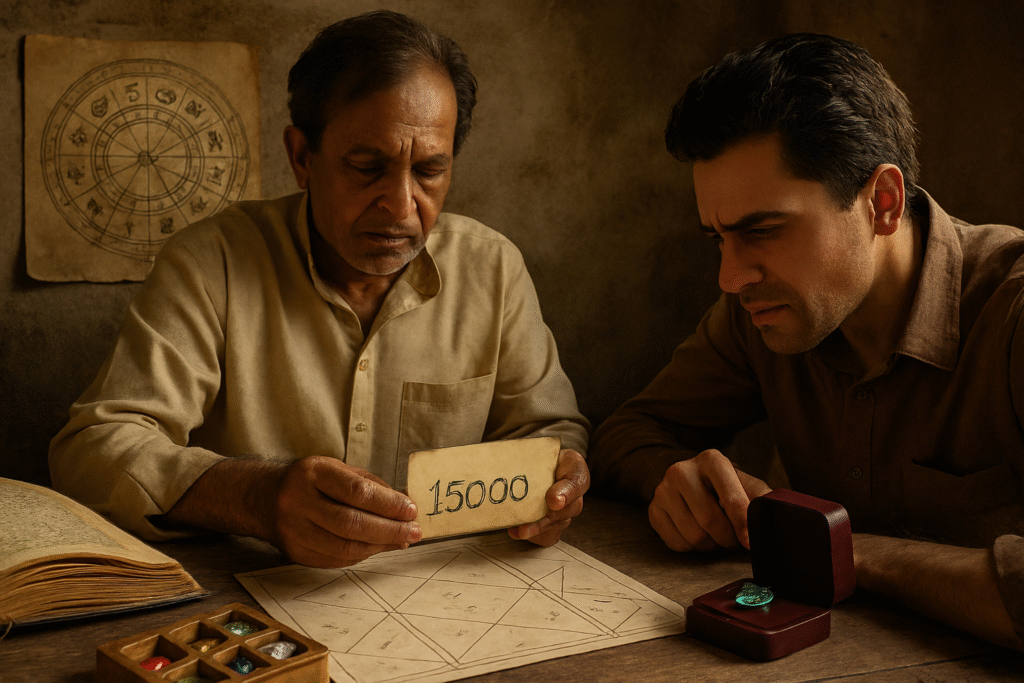When shopping for gems and jewelry, you need to follow practical rules that protect your money and guarantee quality.
- Always buy from a trusted jeweler
- Always ask for a detailed receipt
A reliable jeweler gives you authenticity and accountability. A proper receipt documents purity, gemstone type, and any warranty.
How to Inspect Jewelry Before Buying
Use a 10x magnifying lens. Check:
- Settings: Are the stones held firmly?
- Metal markings: Look for purity marks such as 22K, 18K, 925 (silver), or Pt950 (platinum).
- Maker’s mark: A traceable hallmark adds credibility.
- Stones: Examine for chips, cracks, or flaws that affect beauty and durability.
💡 The key is simple: You rarely find bargains in the gem world. Quality comes at a fair price.
Why Low Prices Can Be Risky
Cheaper jewelry may signal:
- Lower quality materials
- Incorrect labeling (e.g., citrine sold as topaz, or green glass sold as jade)
- Misleading trade names
Research shows that over 60% of jewelry complaints involve misrepresentation of gems.
Understanding Gemstone Value
The value of a gemstone depends on:
1. Color
- Strong, natural colors fetch higher prices.
- Lighting affects how you see color. Always check under natural light.
2. Clarity
- Diamonds, topaz, aquamarine, and tanzanite are judged strictly on inclusions.
- Emeralds and red tourmalines almost always show inclusions, so grading is more lenient.
3. Cut
- Proportions and finish affect sparkle and durability.
- Poorly cut stones may break more easily.
- A high-quality cut improves brilliance by up to 30% compared to average cuts.
4. Carat Weight
- Larger gems cost more per carat because they’re rarer.
- Stones above 40 carats may drop in value if they become impractical for jewelry use.
Case Example: Emeralds
An emerald with vivid green color but visible inclusions can cost more than a flawless light-colored stone. The market pays for intensity of color, not just clarity.
FAQ: Shopping for Gems and Jewelry
Q: What documents should I ask for when buying jewelry?
A: Always request a bill with details on purity, stone weight, and certification.
Q: Are bargains in gemstones real?
A: Rarely. A low price often means poor quality or misrepresentation.
Q: Which factor affects gemstone price the most?
A: Color. For example, a fine blue sapphire can be 50% more expensive than a similar but paler stone.
Q: How do I avoid buying fake jade?
A: Ask for a gemological certificate and avoid vague labels like “jade-like stone.”
Quotable Insights
- “You rarely find true bargains in the gem market. Value is tied to quality and trust.”
- “Color is the single biggest driver of a gemstone’s price.”
- “A skilled cut can increase brilliance by 30% or more.”
Introduction
This Responsible Travel FAQ provides comprehensive answers to help you make ethical tourism choices.
Our guide covers eco-friendly accommodations, local community support, sustainable transportation, cultural respect, wildlife ethics, and ways to reduce waste.
Following these practices ensures your adventures benefit both destinations and travelers.
What is Responsible Travel and Why Does It Matter?
Responsible travel means making conscious choices that minimize negative impact while maximizing benefits for local communities and the environment.
Tourism generates $1.4 trillion annually but produces 8% of global carbon emissions.
Your travel decisions affect local economies, cultural preservation, and environmental conservation.
How Do I Choose Sustainable Accommodations?
Look for eco-certifications such as:
- Green Key
- LEED building standards
- EarthCheck approval
- Rainforest Alliance verification
Check if hotels use renewable energy, water-saving systems, and source food locally.
Ask about waste reduction programs and community involvement. Calling properties directly helps verify claims.
Transportation Options for Responsible Travel
- Train travel emits 80% less carbon than flying for similar distances.
- Choose direct flights when necessary and book economy class.
- Use public transport, bicycles, or walk instead of renting cars.
- Consider verified carbon offsets for unavoidable flights.
Supporting Local Economies
- Buy from locally-owned businesses instead of chains.
- Book community-based tours with local guides.
- Eat at family-owned restaurants with local ingredients.
- Stay in homestays or boutique hotels rather than international chains.
- Purchase authentic handicrafts fairly from artisans.
Packing Tips for Responsible Travel
- Reusable water bottle with filtration
- Solid toiletries to reduce plastic
- Reef-safe mineral sunscreen
- Reusable shopping bags
- Bamboo or metal utensils
- Portable laundry soap
Pack light and choose durable, multipurpose items.
Respecting Local Cultures
- Learn cultural customs, dress codes, and etiquette.
- Learn basic local phrases.
- Dress appropriately for religious and conservative areas.
- Ask permission before photographing people.
- Participate respectfully in cultural activities.
Ethical Wildlife Encounters
- Maintain safe distances and avoid feeding animals.
- Choose conservation-focused sanctuaries, not entertainment attractions.
- Avoid elephant rides, direct contact, or photo opportunities with captive animals.
- Use certified naturalist guides who prioritize welfare and habitat protection.
Reducing Waste During Travel
- Use reusable containers, bags, and utensils.
- Refuse single-use plastics.
- Choose digital tickets and receipts.
- Carry a small trash bag where disposal is limited.
Questions to Ask Tour Operators
- Are staff local and fairly paid?
- How does your business give back to communities?
- What environmental practices are in place?
- Are group sizes limited to reduce pressure on sensitive areas?
- Are wildlife experiences ethical and conservation-focused?
Money and Overtourism Practices
- Use local ATMs and tip according to local customs.
- Support social enterprises and cooperatives.
- Visit during shoulder seasons, off-peak hours, or lesser-known areas.
- Stay longer in fewer destinations.
Responsible Travel on a Budget
- Cook using local market ingredients.
- Use public transportation.
- Stay in local hostels, guesthouses, or homestays.
- Explore free cultural events or walking tours.
- Exchange skills or volunteer for free accommodation.
Pre-Travel Research
- Learn about environmental challenges and cultural sensitivities.
- Check seasonal weather and political situations.
- Identify local organizations to support.
- Read destination-specific responsible travel guides.
Creating a Positive Impact Post-Travel
- Share authentic stories on social media.
- Write detailed reviews for responsible businesses.
- Continue supporting local organizations.
- Apply sustainable practices in daily life.
- Recommend responsible travel to others.
Learn more:



